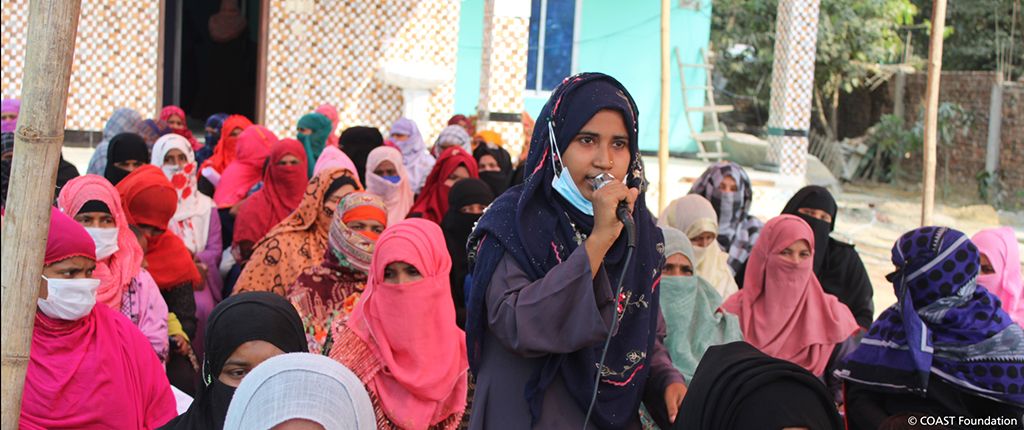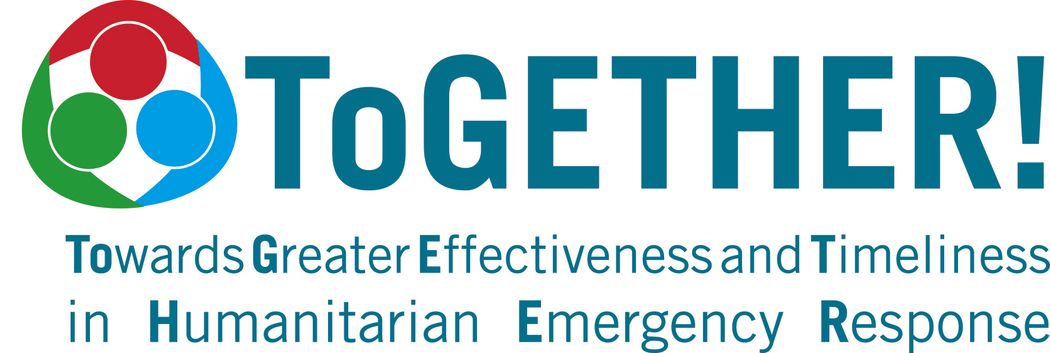
ToGETHER – promoting the localization of humanitarian action
Towards Greater Effectiveness and Timeliness in Humanitarian Emergency Response
We have been committed to strengthening local actors and thus increasing the effectiveness and efficiency of humanitarian aid - and not just since the localization of humanitarian aid was identified as one of the key issues for the future in the final declaration of the Grand Bargain at the first World Humanitarian Summit in Istanbul in 2016.
Together with Welthungerhilfe, Caritas International and Diakonie Katastrophenhilfe, we support eight countries and 40 local partner organizations in a joint localization program (ToGETHER!), fostering capacity building in emergency aid and crisis prevention, coordination and finances, and representation of their interests. The program, which is funded by the German Federal Foreign Office, is being implemented in Ethiopia, Bangladesh, Colombia, the Democratic Republic of Congo, Indonesia, Myanmar, Pakistan and Somalia.
The program aims to put the localization of humanitarian aid in the participating countries into practice. Malteser International has the operational lead in two of the participating countries: Myanmar and Bangladesh.
We work closely with the following local partner organizations:
Bangladesh: Association for Alternative Development (AFAD), Centre for Disability in Development (CDD), Mukti Foundation, Programme for Helpless and Lagged Societies (PHALS), and Efforts for Rural Advancement (ERA).
National organizations are the first to be able to provide assistance on the ground after major disasters. However, they often act as mere implementers of strategic and operational decisions made by international humanitarian organizations. It is therefore vital to support local actors in their own operational preparedness and response capacity, organizational and institutional capabilities, availability of adequate funding, and integration into relevant humanitarian coordination mechanisms. Equally important is the reconfiguration of roles among different actors within the humanitarian system.
The Covid-19 pandemic has accelerated this development. During local lockdowns, international experts and non-governmental organizations were no longer able to travel and operate in many regions. Local actors have maintained access to the affected people and, in some cases, made it possible in the first place.
Our overarching goal is to reduce the impact of disasters on local populations in countries of operation through localized, effective, rapid, and accountable humanitarian assistance.
Our vision is to promote equal, complementary partnerships between local/national NGOs and international NGOs. We want to strengthen the leading role of local/national NGOs in the humanitarian system ("local leadership") and the localization agenda at an international level.
The ToGETHER program also aims to transcend organizational boundaries and enable all local and international partners involved to jointly develop approaches to humanitarian challenges that they would not have been able to realize on their own to this extent and with this added value. We therefore aim to achieve the following sub-goals:
- Local partners take a leading role in strategic program implementation & coordination of humanitarian assistance in their countries
- Institutional and operational capacities of local partners are strengthened
- Local partners receive direct funding under the program for innovation and humanitarian relief operations
- Knowledge sharing, learning and advocacy improve localized, effective and rapid humanitarian response
- Establishment of a "Program Advisory Committee" to discuss and solve problems
- Establish comprehensive project structures in each country
- Introduction of peer review mechanisms
- Implement monitoring, evaluation, accountability and learning systems in the field.
- Establish plans for strengthening local capacity
- Regular implementation of coordination units
- Strengthening disaster preparedness and response capacity in 8 countries
- Create and provide information, resources, and reference materials (guidance documents, institutional standard operating procedures, etc.)
- Provide direct funding for innovation and humanitarian relief operations
- Review, collect and spread localization procedures in each country
- Develop training sessions on various topics
- Conducting workshops and meetings for exchange and shared learning (South-South exchanges, project workshops)
- Organizing and holding conferences (at national, regional and international levels) to share best practices and promote innovative approaches
- Development of digital solutions for knowledge management, cooperation and exchange on the topics of localization and partner strengthening beyond individual organizations
- Create publications

Information Bangladesh
Capital: Dhaka
Area: 147,570 km²
Population: approx. 166.3 million
Information Myanmar
Capital: Naypyidaw
Area: 676,578 km²
Population: approx. 51.5 million
Project Information
Duration: since March 2020
Funding: German Federal Foreign Office via Welthungerhilfe
Co-Funding: Germany’s Relief Coalition (ADH)
Partners: Caritas International, Diakonie Katastrophenhilfe, Deutsche Welthungerhilfe
Partner in Bangladesh: Association for Alternative Development (AFAD), Centre for Disability in Development (CDD), Mukti Foundation, Programme for Helpless and Lagged Societies (PHALS), and Efforts for Rural Advancement (ERA)
Find out more about ToGETHER localization program:








